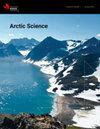Sentinel responses of Arctic freshwater systems to climate: linkages, evidence, and a roadmap for future research
IF 3.2
3区 地球科学
Q2 ECOLOGY
引用次数: 2
Abstract
While the sentinel nature of freshwater systems is now well-recognized, widespread integration of freshwater processes and patterns into our understanding of broader climate-driven Arctic terrestrial ecosystem change has been slow. We review the current understanding across Arctic freshwater systems of key sentinel responses to climate, which are attributes of these systems with demonstrated and sensitive responses to climate forcing. These include ice regimes, temperature and thermal structure, river baseflow, lake area and water level, permafrost-derived dissolved ions and nutrients, carbon mobilization (dissolved organic carbon, greenhouse gases, and radiocarbon), dissolved oxygen concentrations, lake trophic state, various aquatic organisms and their traits, and invasive species. For each sentinel, our objectives are to clarify linkages to climate, describe key insights already gained, and provide suggestions for future research based on current knowledge gaps. We suggest that tracking key responses in Arctic freshwater systems will expand understanding of the breadth and depth of climate-driven Arctic ecosystem changes, provide early indicators of looming, broader changes across the landscape, and improve protection of freshwater biodiversity and resources.北极淡水系统对气候的哨兵反应:联系、证据和未来研究路线图
虽然淡水系统的哨兵性质现在已经得到了很好的认识,但淡水过程和模式与我们对更广泛的气候驱动的北极陆地生态系统变化的理解的广泛结合一直很缓慢。我们回顾了目前北极淡水系统对气候的关键哨兵反应的理解,这些反应是这些系统对气候强迫的敏感反应。其中包括冰况、温度和热结构、河流基流、湖泊面积和水位、永久冻土衍生的溶解离子和营养物质、碳动员(溶解有机碳、温室气体和放射性碳)、溶解氧浓度、湖泊营养状态、各种水生生物及其特征以及入侵物种。对于每个哨兵,我们的目标是澄清与气候的联系,描述已经获得的关键见解,并根据当前的知识差距为未来的研究提供建议。我们建议,跟踪北极淡水系统的关键反应将扩大对气候驱动的北极生态系统变化的广度和深度的理解,为整个景观中迫在眉睫的更广泛变化提供早期指标,并改善对淡水生物多样性和资源的保护。
本文章由计算机程序翻译,如有差异,请以英文原文为准。
求助全文
约1分钟内获得全文
求助全文
来源期刊

Arctic Science
Agricultural and Biological Sciences-General Agricultural and Biological Sciences
CiteScore
5.00
自引率
12.10%
发文量
81
期刊介绍:
Arctic Science is an interdisciplinary journal that publishes original peer-reviewed research from all areas of natural science and applied science & engineering related to northern Polar Regions. The focus on basic and applied science includes the traditional knowledge and observations of the indigenous peoples of the region as well as cutting-edge developments in biological, chemical, physical and engineering science in all northern environments. Reports on interdisciplinary research are encouraged. Special issues and sections dealing with important issues in northern polar science are also considered.
 求助内容:
求助内容: 应助结果提醒方式:
应助结果提醒方式:


